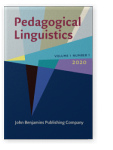Linguistics, language teaching objectives and the language learning process
Linguistics has always been taken as the authoritative frame of reference for how language is represented as a pedagogic subject, and as approaches to linguistic description have changed so accordingly have approaches to language teaching. But the purposes that determine what aspects of language are to be abstracted as relevant for linguistic description do not correspond with those of language pedagogy. What linguistics provides are ways of specifying what is to be taught as the eventual learning objective in relative disregard of the learning process, a process that it is the essential purpose of pedagogy to promote. An alternative to this customary objective driven approach, would be to focus not on acquiring competence in a particular and separate L2 but on extending the general capability for using language as a communicative resource that learners have already acquired in their L1. Such an approach effectively makes the primary objective of pedagogy the development of the learning process itself.
Article outline
- 1.Introduction
- 2.Linguistic description and pedagogic design
- 3.The objective and process of language learning
- 4.The learning process as objective: An alternative approach
-
References
This article is currently available as a sample article.
References
Chomsky, N.
(
1966/71)
Linguistic theory. In
R. G. Mead (Ed.),
Language teaching: Broader contexts. Northeast Conference on the Teaching of Modern Languages: Reports of the working committees. New York: MLA Materials Center. Reprinted 1971 in
J. P. B. Allen &
P. van Buren (Eds.),
Chomsky: Selected readings. (pp. 152–159). Oxford: Oxford University Press.

Ellis, R.
(
2003)
Task based language learning and teaching. Oxford: Oxford University Press.

Ellis, R.
(
2015)
Understanding second language acquisition (2nd edn). Oxford: Oxford University Press.

Garcia, O., & Li Wei
(
2014)
Translanguaging: Language, bilingualism and education. London. Palgrave Macmillan.


Garrett, P., & Cots, J.
(Eds.) (
2017)
Routledge handbook of language awareness. London: Routledge.


Halliday, M. A. K., McIntosh, A., & Strevens, P.
(
1964)
The linguistic sciences and language teaching. London: Longman.

Housen, A., & Kuiken, F.
(Eds.) (
2009)
Complexity, accuracy, and fluency (CAF) in second language acquisition research [Special issue].
Applied Linguistics, 30(4).

Howatt, A., with Widdowson, H.
(
2004)
A history of English language Teaching. Oxford: Oxford University Press.

Hymes, D. H.
(
1972)
On communicative competence. In
J. Pride &
J. Holmes (Eds.),
Sociolinguistics: Selected readings (pp. 269–293). Harmondsworth: Penguin Books.

Labov, W.
(
1970)
The study of language in its social context.
Studium Generale, Vol. 231. Reprinted in
Labov, W. (1972)
Sociolinguistic patterns. Philadelphia, PA: University of Pennsylvania Press.

Lightbown, P., & Spada, N.
(
2013)
How languages are learned (4th edn). Oxford: Oxford University Press.

Sinclair, J.
(
1991)
Shared knowledge In
J. Alatis (Ed.),
Linguistics and language pedagogy: The state of the art (pp. 11–24). Washington, DC: Georgetown University Press.

Sinclair, J.
(
1997)
Corpus evidence in language description. In
A. Wichmann,
S. Fligelstone,
T. McEnery &
G. Knowles (Eds.),
Teaching and language corpora. (pp. 27–39). London: Longman.

Widdowson, H.
(
1997)
The pedagogic relevance of language awareness.
Fremdsprachen Lehren und Lernen, 261, 33–43.

Widdowson, H.
(
2003)
Defining issues in English language teaching. Oxford: Oxford University Press.

Widdowson, H.
(
2020)
On the subject of English: The linguistics of language use and learning. Berlin: Mouton de Gruyter.


Cited by
Cited by 2 other publications
Boldireff, Anastasia & Chris Bober
Riegler, Stefanie
2021.
Normativity in language teacher learning: ELF and the European Portfolio for Student Teachers of Languages (EPOSTL).
Journal of English as a Lingua Franca 10:1
► pp. 89 ff.

This list is based on CrossRef data as of 17 april 2022. Please note that it may not be complete. Sources presented here have been supplied by the respective publishers.
Any errors therein should be reported to them.
